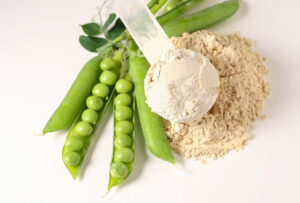Non-dairy and plant-based beverages continue to grow at a substantial rate. According to Global News Wire, the global plant-based beverages market was valued at $15.3 billion in 2019 and will reach past the valuation of $34.8 billion by the year-end of 2026. This should be no surprise with more consumers choosing beverages that contribute to sustainability. Innova Insight’s number one trend, “Shared Planet,” describes consumers’ collective responsibility for taking care of the environment. Non-dairy alternatives combat environmental issues such as sustainability, lowering greenhouse gases, and animal welfare.
Consumers are not just focused on sustainability. They are also keeping health and nutrition top of mind. Protein claims are one of the most common claims on non-dairy and plant-based beverages. The majority of non-dairy and plant-based beverages are made using protein ingredients. David McKeage, IFPC Food Applications Scientist, weighs in on how protein ingredients are used in protein fortified non-dairy beverages.
Q&A with David McKeage, Food Applications Scientist

- What are the most typical novel protein ingredients currently used in the fortification of non-dairy beverages? What are some future protein ingredients you see being used?
“In general, the most widely used proteins for fortifying non-dairy beverages are plant-based. Examples would be soy, pea, rice, fava bean, hemp, and almond/cashew. Many believe that ‘novel proteins’ should also qualify as sustainable alternatives to customary protein sources. Some examples of these may include macroalgae, insects, and single-cell proteins. Some of these technologies though are at a very early stage of development.” - What are some innovative ways you have seen protein ingredients used in non-dairy beverages?
“The holy grail for plant-based non-dairy beverages is matching the experience of drinking cow’s milk. New developments in flavoring and mouthfeel are moving the needle. One example is Silk’s “Next Milk” which contains a blend of oat milk, coconut milk, coconut oil, and soy protein isolate. The blending of proteins such as pea protein with a complementary protein source, such as rice, can help achieve a PDCAAS score of 1.0, a rising metric that is characterized as a “Complete Protein.” - What are some key health benefits of fortifying non-dairy beverages with protein?
“General wellness and heart health, allergen concerns, lactose intolerance, weight loss benefits, muscle building, and additional beneficial nutrients, including fiber, vitamins, minerals, and phytonutrients. In addition, increased protein intake has cholesterol-lowering benefits as well as increased satiety.” - What are some of the key consumer and new product trends you have seen with protein-packed non-dairy beverages?
“Realistic plant-based milk alternatives that match the sensory and nutritional aspects of real milk. Continuation of fermented high protein beverages, plant protein blends using legumes, seeds, or nuts, as well as coffee containing plant protein beverages.” - How do protein ingredients contribute to sustainability?
“They tend to have a low environmental impact as well as reduced energy consumption, emissions, land usage, and water consumption.”
Whether you are looking to create new protein fortified non-dairy beverages or looking to re-formulate, IFPC can help. We have the technical expertise to assist in perfecting the taste, texture, and quality of your product. Get in touch with us today.

